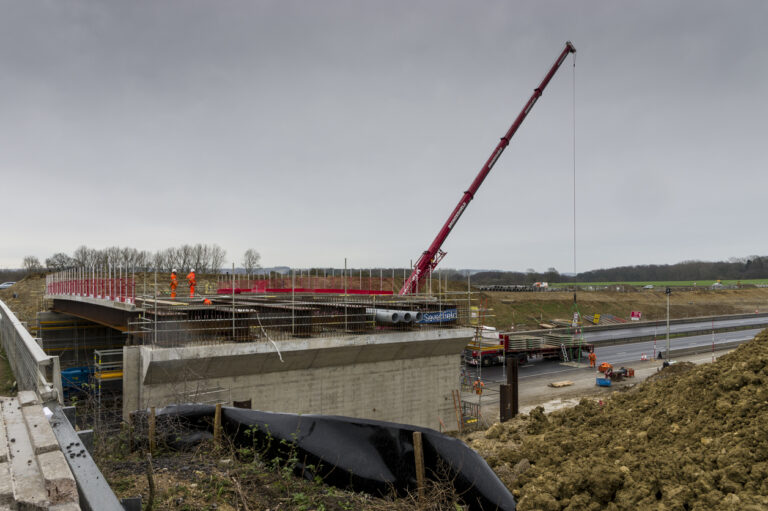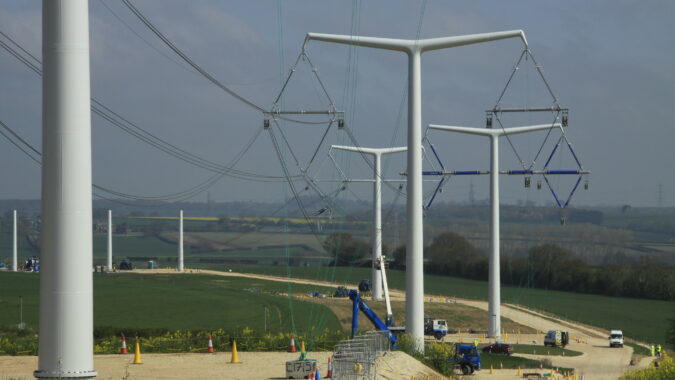Water & Floods
Infrastructure can deliver a safe and reliable water supply and improved flood resilience to keep pace with a changing climate and growing population.
Updated:

Summary
With extreme weather events such as floods and drought more likely in future years, cities, towns and villages need to be prepared. Currently nearly one million homes in the UK have more than one per cent chance of flooding in any given year, and there is a one in four chance of a severe drought before 2050.
Similarly, the demands on our water and wastewater systems are increasing as the population grows.
The Commission advises on how government can work with industry and other stakeholders to mitigate such risks with long term plans for adaption and resilience and through measures like a catchment based approach to flood resilience.
To avoid the risk of severe drought, the Commission’s analysis suggests that additional water supply and demand reduction totalling 4,000Ml/day should be delivered by 2050 – the equivalent of well over 22 million bath tubs of water. Our work on water seeks to inform decision making about the future capacity of the water supply and wastewater systems in England, by increasing capacity and reducing leaks and wastage to reduce the risk of drought.
In the Second National Infrastructure Assessment, the Commission recommends that government and Ofwat – the regulator – should together ensure plans are in place to deliver additional supply and demand reduction of at least 4,000 Ml/day, including at least 1,300 Ml/day provided by the mid-2030s through new transfer and storage infrastructure provided through the RAPID process.
Our 2022 study on the risk of surface water flooding found that up to 600,000 properties could be at high risk of this type of flooding over the next three decades. In response, the report said stricter controls on new developments connecting to existing drainage systems, along with up to £12bn in additional investment in drainage infrastructure, could move up to 250,000 properties in England out of this high risk category.
This and other recommendations on surface water flooding were subsequently reflected in the second Assessment, alongside a recommendation for government to set a long term, measurable target to reduce the number of properties likely to be flooded by rivers or the sea. The government formally responded to this study in March 2024, accepting the principles behind the Commission’s recommendations but making few new commitments on steps to manage surface water flood risk more actively, or accelerate progress on existing commitments regarding sustainable drainage and stopping automatic sewer connections for new developments.
Water & floods data
A range of water & floods data sets is available to review on our Data page. This includes data sets used in Commission reports, as well as historic data sets. Each can be reviewed online or downloaded.
Review dataNext Section: Key issues
Here you will find a summary of the Commission’s position on key issues emerging from our work related to water, waste water, floods and drought.
Key issues
Here you will find a summary of the Commission’s position on key issues emerging from our work related to water, waste water, floods and drought.
Surface water flooding risk
Around 325,000 English properties are currently at high risk of flooding caused by heavy rainfall, more commonly referred to as ‘surface water flooding’. This type of flooding can cause major disruption to people’s lives and livelihoods. The Commission’s study into this risk found that, without action, climate change and urbanisation could put an additional 230,000 properties at high risk by 2055.
Surface water flooding is highly localised and requires local knowledge and solutions. But local areas currently have to bid for funding for schemes to address it, and do not have local targets, or plans formed jointly across all the relevant organisations including water and sewerage companies.
There need to be long term targets for surface water flood risk reduction, devolved funding to the areas at highest risk, and costed joint plans at a local level. It is not affordable to eliminate surface water flood risk everywhere, but a more focussed and coordinated approach can significantly reduce the numbers of properties that would otherwise be at risk.
The Commission in response recommended that:
- government acts to mitigate the impact of urban development on surface water flooding
- the Environment Agency should improve identification of the highest risk areas, drawing on local maps and models
- government should set a long term target for a reduction in the number of properties at high and medium risk of surface water flooding
- government should clarify in its strategic priorities that Ofwat should enable water and sewerage companies to invest in solutions to manage surface water flooding, including nature based solutions where appropriate
- in high risk areas, local authorities, water and sewerage companies and, where relevant, internal drainage boards, should be required to develop costed, long term, joint plans to manage surface water flooding, including local targets for risk reduction, assured by the Environment Agency with input from Ofwat
- government should devolve public funding to upper tier local authorities in the new flood risk areas based on their level of risk
- for properties remaining at high risk of flooding, government should explore options for funding property level measures.
This report informed the recommendations in the Second National Infrastructure Assessment, linked to the theme of climate resilience and protecting the environment.
The government formally responded in March to final report of the study on surface water flooding. While it accepted the principles behind a number of the Commission’s recommendations, its response made few new commitments on steps to manage surface water flood risk more actively, and did not accelerate work in key areas, such as removing barriers to joint working between local agencies; while it did not accept the Commission’s call for new national risk standards, the government has agreed to further consider the merits of their introduction. In response, the Commission said the government’s plans did not meet the scale of the challenge faced.
Flooding from rivers and the sea
Climate change increases the likelihood of flooding. UK cities, towns and villages must adapt and improve their resilience to its impacts: currently, about five million homes are at risk.
Floods impact on people’s lives as well as causing economic damage, but the current approach to managing flood risk is piecemeal, with progress on improving protection hard to measure.
The Second National Infrastructure Assessment has set out the need for government to establish a long term target for reducing the number of properties likely to be flooded by rivers and the sea, and to track progress against this.
The Commission made the case for a nationwide standard of resilience to flooding, while also recognising that different standards of protection may be necessary in some local areas. In such cases other elements of resilience such as warning, preparing and recovering from flooding will be even more important. To support this, a new long term funding strategy is needed to better prepare and protect all parts of the country against flooding.
Flood protection should also maximise the use of nature based and catchment solutions, in recognition of the additional environmental benefits they can bring.
Finally, planning authorities should ensure that new development does not increase flood risk elsewhere.
Reducing the risk of drought
Climate change and population growth puts increasing pressure on England’s water: there is a one in four chance of a serious drought before 2050. In our 2018 report Preparing for a drier future, Commission research showed it was almost half as expensive as relying on emergency measures in times of drought (saving up to £20 billion over the next 30 years).
A twin-track approach of managing demand and enhancing supply is needed to deliver by 2050 an extra 4,000 million litres of water every day to reduce the risk of drought. This can be achieved by the government, regulators and water companies working together to deliver a national water transfer network and additional supply by the 2030s, halving leakage by 2050 and better managing demand.
In the Second National Infrastructure Assessment the Commission recommended that government should enable all water companies to roll out compulsory smart metered charging to better manage demand. The Assessment also argued that water resource expenditure, on both supply and demand, should not be priced out of the upcoming price review in the face of other upwards pressures on bills.
Resilience of water and flood infrastructure
Water and flood infrastructure systems should build resilience to future climate change. This includes recommendations in the Second National Infrastructure Assessment on ensuring there is sufficient water supply and that flood infrastructure is designed with the future and not the current climate in mind. The second Assessment has also made recommendations on the need for outcome based resilience standards for all infrastructure services (including water) and the need for operators to establish the cost of maintaining resilience between now and 2050 and ensure they are building resilience into new infrastructure assets more broadly, such as through ensuring technical engineering standards factor in future climate change.
Headline recommendations
Identify the specific telecommunications needs of the energy, water and transport sectors
Government should identify the specific telecommunications needs of the energy, water and transport sectors and ensure that infrastructure is delivered to meet these by, at the latest, 2030 for the energy and water sectors and 2035 for the road and rail sectors. Strategies for how this will be achieved must be set out by the end of 2025 for energy and water and by the end of 2026 for road and rail, including:
- the most cost effective network deployment models, and the extent to which infrastructure can be shared between different sectors
- a spectrum authorisation approach that ensures access to adequate spectrum, whether dedicated national bands or shared spectrum for infrastructure users
- clear responsibilities within government for delivering telecoms strategies
- consideration of whether dedicated networks and spectrum or upgrades to existing networks can meet specific public policy goals, including consistent and reliable rail passenger connectivity.
Set outcome based resilience standards for energy, water, digital and transport services
By 2025, government should:
- following advice from regulators, publish a full set of outcome based resilience standards for energy, water, digital, and transport services, committing to future reviews every five years
- require regulators to ensure their determinations in future regulatory settlements are consistent with operators meeting these resilience standards in the short and longer term
- require regulators to put in place a system for cross sector stress testing which addresses interdependencies and the risk of cascade failures.
Ask infrastructure operators to estimate the cost of maintaining government resilience standards up to 2050
In time to inform the next round of regulatory settlements (for water, digital and energy networks) or spending reviews (for road and rail networks and flood risk management infrastructure), government should ask infrastructure operators to estimate the costs of maintaining government resilience standards in the face of projected climate change to 2050. For sectors without formal spending settlements, such as ports and waste, these should be reported by 2029. All sectors should publicly report adaptation costs in a compulsory fifth round of Adaptation Reporting Power reports in 2029
Ensure technical engineering standards factor in future climate change
By the end of 2026 government should work with the relevant standards bodies to identify and update core technical engineering standards to factor in future climate change
Progress measures to control the area of impermeable surfaces to reduce the risk of surface water flooding
In relation to surface water flooding, government should progress measures to control the area of impermeable surfaces, accurately identify areas where the most properties are at risk and set a clear long term target to reduce properties at risk. The appropriate flood risk management authorities should develop single joint plans to deliver the reductions in risk. These plans should be supported by devolving funds from national budgets with local public and private contributions, particularly from water companies where their assets need to be improved to reduce the risk. Full details of the recommendations can be found in Reducing the risk of surface water flooding
Set a long term measurable target to reduce the number of properties likely to be flooded by rivers or the sea
By 2025, government should set a long term measurable target to reduce the number of properties likely to be flooded by rivers or the sea. Progress against this target should be tracked using the Environment Agency’s new National Flood Risk Assessment and take account of property level protection.
In setting and delivering the target, government should:
- use as a starting point the Commission’s proposed standard of protection against flooding of an annual likelihood of 0.5 per cent and 0.1 per cent for densely populated areas
- make use of National Flood Risk Assessment 2 and future iterations of the Environment Agency’s Long Term Investment Scenarios to quantify risk and establish targets for cost effective risk reduction
- adopt different standard of protections in local areas, where cost effective and based on discussions with affected communities
- invest in line with the profile set out by the Commission
- maximise the use of nature based and catchment solutions and consider the additional benefits beyond flood mitigation that they bring
- adequately fund wider resilience measures to prepare for and recover from flooding
- require planning authorities to ensure that from 2026 all new development is resilient to flooding from rivers with an annual likelihood of 0.5 per cent for its lifetime and does not increase risk elsewhere.
Ensure plans are in place to deliver additional supply and demand reduction of at least 4,000 mega litres per day
Government and Ofwat should ensure plans are in place to deliver additional supply and demand reduction of at least 4,000 mega litres per day. Action to deliver this twin track approach should include:
- the Regulators’ Alliance for Progressing Infrastructure Development and Price Review process ensuring that at least 1,300 mega litres per day is provided by the mid 2030s through (i) additional strategic water transfers and (ii) additional supply infrastructure
- the water industry maintaining its objective to halve leakage from 2017-18 levels by 2050, with Ofwat agreeing five year commitments for each company (as part of the regulatory cycle) and reporting on progress
- the Department for Environment, Food and Rural Affairs enabling companies to implement compulsory metering beyond water stressed areas by 2025, by amending regulations as appropriate and requiring all companies to systematically roll out smart meters as a first step in a concerted campaign to reduce water demand to 110 litres per person per day and to reduce non-household usage by 15 per cent by 2050.
Require infrastructure network and asset plans for the flood management, transport and water sectors
Government should require infrastructure network and asset plans for the flood management, transport and water sectors to maximise the opportunity to improve natural capital by taking an integrated and strategic approach to maintenance and renewals. Infrastructure operators in these sectors should:
- publish regular reports on the state of environmental water quality and biodiversity on their estates or affected by their assets
- develop and fund maintenance and renewal strategies that deliver a net improvement in environmental water quality and biodiversity by altering operating and maintenance regimes and materials, incorporating new design features reflective of nature based solutions, and in some cases moving spend from the development of ‘new’ to existing assets.
Guidanceand objectives should be delivered by:
- the Department for Transport to inform National Highways’ Road Investment Strategies and Network Rail’s Control Period 8
- the Environment Agency as part of its enabling and supporting programmes included in the next Flood and Coastal Erosion Investment plan, due to start in 2027
- Ofwat working with the environmental regulators, to inform operation, maintenance and renewals activities in 2030-35.
Government should act to mitigate the impact of urbanisation
By the end of 2023, government should implement Schedule 3 of the Flood and Water Management Act 2010 and update its technical standards for sustainable drainage systems.
Drainage systems must be improved to protect properties in the coming decades
Government should undertake a comprehensive review of the effectiveness of all available options to manage unplanned increases in impermeable (or hard) surfaces, and their costs and benefits. By the end of 2024, government should decide whether policy changes are required to reduce the impacts on surface water flooding or adjust investment levels for flood risk reduction accordingly.
Action to identify the places most at risk
Government should:
- require the Environment Agency to use the results of the second National Flood Risk Assessment in 2024 to identify new flood risk areas
- from 2025, require upper tier local authorities, water and sewerage companies, and other relevant authorities in the new flood risk areas to, where necessary, develop detailed local risk maps that can be integrated into the Environment Agency’s national map, and models that can be used to plan future management of surface water flooding.
Government should set national risk reduction targets to drive and monitor progress
By early 2025, government should set a long term target for a percentage reduction in the number of properties at high and medium risk of surface water flooding
Agree local targets by mid 2025
The government should require risk management authorities in the new flood risk areas to agree appropriate local targets by mid 2025
Water and sewerage companies should play a key role in reducing risk
Government should:
- clarify in its strategic priorities for Ofwat that it should enable water and sewerage companies to invest in solutions to manage surface water flooding including sustainable drainage
Single, costed, joint plans
Government should require:
- upper tier local authorities, water and sewerage companies, and, where relevant, internal drainage boards in the new flood risk areas to produce and deliver costed, joint investment plans for managing surface water that achieve the agreed local objectives and follow the ‘solutions hierarchy’
- the Environment Agency to review and assure the final plans with input from Ofwat and support from Regional Flood and Coastal Committees, and publish data on progress against local and national targets
- joint plans to be completed by 2026 and revised every five years following the review of flood risk areas the year before, and to inform the following Ofwat Price Review.
Devolved local funding for local flood risks
By the end of 2025, government should devolve public funding to upper tier local authorities in or containing new flood risk areas, based on the Environment Agency’s assessment of the levels of risk in each new flood risk area. The funding allocation should be reviewed every five years, in line with single joint plan cycles.
There should be support for properties remaining at risk
By the end of 2024, government should explore options for funding property level measures for those properties that remain at high risk of surface water flooding because improving drainage infrastructure is not cost effective.
Latest Updates

Government response on surface water flooding risk “does not meet scale of challenge”
The government has today (13 March 2024) responded to the Commission’s study on reducing the risks of surface water flooding, published in November 2022. While it accepts the principles behind a number of the Commission’s recommendations, the government’s response – in the Commission’s view – makes few new commitments on steps to manage surface water...

James Heath: urgent planning reform needed to remove “binding constraint” on UK’s economic future
James Heath, chief executive of the National Infrastructure Commission, spoke at the Nationally Significant Infrastructure Projects Forum in London yesterday (6 March). James offered the Commission’s view on the vital importance of speeding up the planning regime for major projects, given the need for pace in delivering tens of billions of pounds’ worth of schemes...

Cost effective delivery of infrastructure projects
Project exploring how the UK can build economic infrastructure more quickly and cheaply, and compare favourably with its international peers.

Hall: Measurable approach to flood risk “essential”
The House of Commons Public Accounts Committee has warned that the continued lack of a national standard for flood resilience is undermining government’s efforts to boost the country’s resilience to sea and river flooding. Its new report Resilience to flooding also raises concerns that inflation and excessive bureaucracy will reduce the number of major flood...

Jim Hall: Clarity on funding, clear targets crucial to long term flood resilience
A value for money report on flood resilience in England published by the National Audit Office today (15 November) warns that under current Environment Agency plans, forty per cent fewer properties in England will be protected from flooding compared to the number first forecast in 2020. The Resilience to flooding report finds that the Environment...

Long term review sets out pressing need to modernise infrastructure to support economic growth and climate action
Improved infrastructure to boost economic growth across the UK and meet climate goals is both achievable and affordable if the right policy steps are taken now, according to the government’s independent advisers on infrastructure strategy. The Second National Infrastructure Assessment – a five yearly review conducted by the National Infrastructure Commission – sets out a...

Second National Infrastructure Assessment
The Commission's thirty year plan for a low carbon and resilient UK economy that supports economic growth and protects the natural environment

National Infrastructure Assessment
An analysis of the UK’s long term economic infrastructure needs, outlining a strategic vision over the next thirty years.

Submission of final water plans marks important step in tackling England’s supply gap
The National Infrastructure Commission has welcomed the submission of the remaining water company Water Resource Management Plans to Ofwat ahead of the regulator’s upcoming price review process which determines the levels of investment companies are able to make in new infrastructure. Today (31 August) is the deadline by which water companies yet to submit their...

Letter to Ofwat on water company asset management
Commission Chief Executive James Heath has written to Ofwat Chief Executive David Black about asset management in the water sector, specifically the approach to ‘base cost’ maintenance costs for ensuring day-to-day services (e.g. replacing water mains pipes). The letter raises concerns about the lack of a consistent understanding of asset condition across the sector and...

Stronger coordination of environment and community benefit needed to get planning timescales back on track
A new data platform to share environmental information and effective ways of addressing the impact of proposed infrastructure projects will enable stronger protection for natural habitats and speed up schemes crucial to the net zero transition, according to a new report by the National Infrastructure Commission. The review by the government’s official infrastructure advisers also...

Infrastructure planning system
A short study reviewing the current processes for reviewing national policy statements for key infrastructure sectors

Delivering net zero, climate resilience and growth

Go big where it counts to hit economic and climate goals, says Commission
Government must develop stronger staying power and focus on fewer, bigger, better targeted initiatives to deliver the infrastructure needed to meet its long term goals for economic growth and a lower carbon economy, the UK’s independent advisers on infrastructure have said. The last year has seen progress towards major infrastructure objectives “stutter further just as...

Infrastructure Progress Review 2023
Our annual monitoring report on government progress towards major infrastructure objectives.